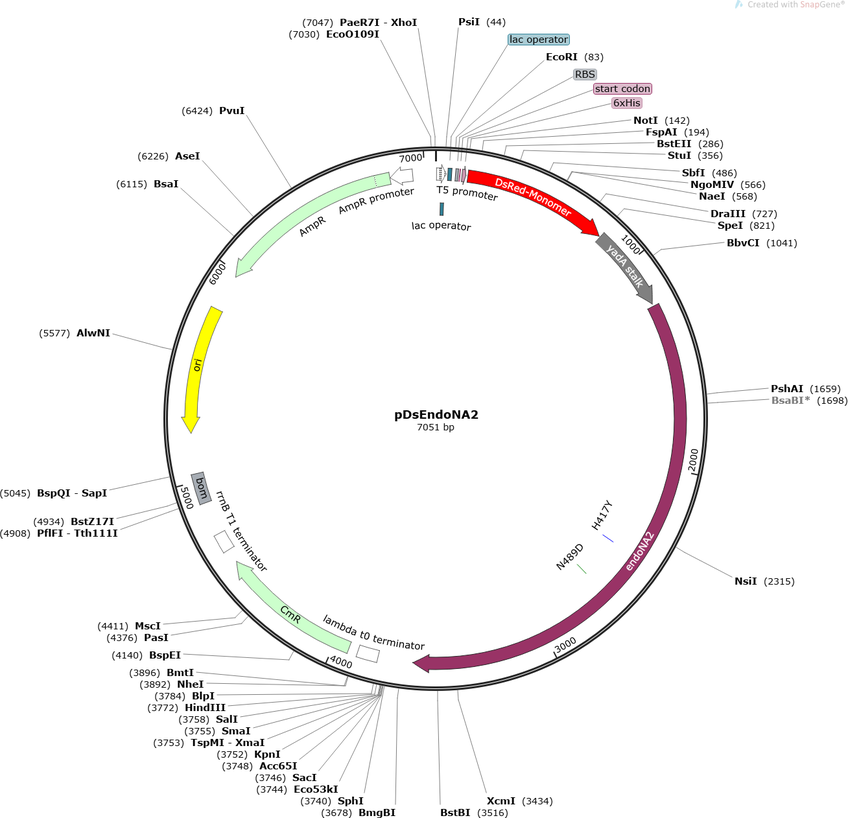pDsEndoNA2
(Plasmid
#174728)
-
PurposeExpresses DsRed-endoNA2 fusion protein for detection of polysialic acid. The endoNA2 is a catalytically inactive form of endosialidase from bacteriophage PK1A2.
-
Depositing Lab
-
Sequence Information
Ordering
| Item | Catalog # | Description | Quantity | Price (USD) | |
|---|---|---|---|---|---|
| Plasmid | 174728 | Standard format: Plasmid sent in bacteria as agar stab | 1 | $85 | |
Backbone
-
Vector backbonepFEndoNA2
-
Backbone manufacturerFinne lab
- Backbone size w/o insert (bp) 7102
- Total vector size (bp) 7051
-
Modifications to backboneThe egfp gene deleted, and NotI and SpeI restriction sites introduced
-
Vector typeBacterial Expression
Growth in Bacteria
-
Bacterial Resistance(s)Ampicillin, 100 μg/mL
-
Growth Temperature37°C
-
Growth Strain(s)NEB Stable
-
Copy numberHigh Copy
Gene/Insert
-
Gene/Insert nameDsRed-Monomer
-
Alt nameDsRed. M1
-
SpeciesDiscosoma sp.
-
Insert Size (bp)686
-
GenBank IDEU827527.1
- Promoter T5
-
Tag
/ Fusion Protein
- Histag (N terminal on backbone)
Cloning Information
- Cloning method Restriction Enzyme
- 5′ cloning site NotI (not destroyed)
- 3′ cloning site SpeI (not destroyed)
- 5′ sequencing primer CCCGAAAAGTGCCACCTG (Common Sequencing Primers)
Resource Information
-
Supplemental Documents
Terms and Licenses
-
Academic/Nonprofit Terms
-
Industry Terms
- Not Available to Industry
Trademarks:
- Zeocin® is an InvivoGen trademark.
Depositor Comments
This plasmid can be amplified and maintained in ampicillin-sensitive E. coli strains that harbor the lacIq mutation (such as XL1 Blue and JM109) or carries the pREP4 repressor plasmid (such as M15 [pREP4]).
These plasmids were created by your colleagues. Please acknowledge the Principal Investigator, cite the article in which the plasmids were described, and include Addgene in the Materials and Methods of your future publications.
-
For your Materials & Methods section:
pDsEndoNA2 was a gift from Jukka Finne (Addgene plasmid # 174728 ; http://n2t.net/addgene:174728 ; RRID:Addgene_174728) -
For your References section:
Internalization of a polysialic acid-binding Escherichia coli bacteriophage into eukaryotic neuroblastoma cells. Lehti TA, Pajunen MI, Skog MS, Finne J. Nat Commun. 2017 Dec 4;8(1):1915. doi: 10.1038/s41467-017-02057-3. 10.1038/s41467-017-02057-3 PubMed 29203765





